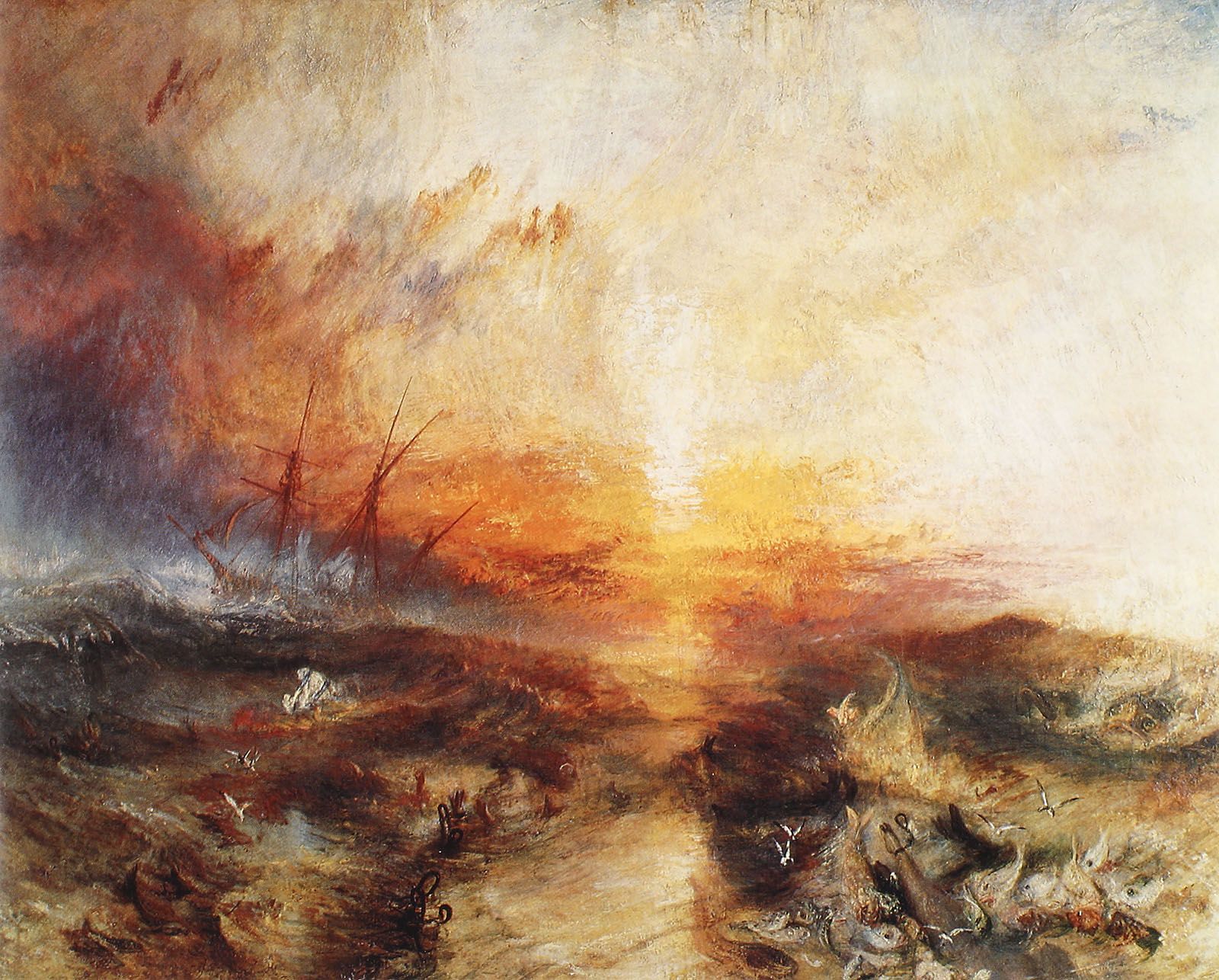Convegno
Moral Seascapes: Critical Perspectives
Workshop and meeting at the Kunsthistorisches Institut in Florenz – Max-Planck-Institut
in collaboration with the Leibniz-Zentrum für Literatur- und Kulturforschung (ZfL)
and the University of Vienna
Organized by Jonathan Stafford, Henning Trüper (both ERC Project Archipelagic Imperatives: Shipwreck and Lifesaving in European Societies since 1800, ZfL Berlin), and Burkhardt Wolf (German Department, University of Vienna) in collaboration with Hannah Baader (KHI)

Joseph Mallord William Turner, Slavers Throwing overboard the Dead and Dying – Typhon coming on (The Slave Ship), 1840, oil on canvas, 91 x 122 cm, Museum of Fine Arts, Boston
The history of the visual tropes of seafaring and shipwreck, in the period since 1800, has commonly focused on metaphysical meanings to do with the relationship between the subject and the world, on one hand, and socio-economic meanings to do with, e.g., the transformations of capitalism, on the other. Between these two groups of meanings lies a relatively more neglected third one, that of morality. Traditionally, especially in the early modern genre of shipwreck painting, such moral meanings had held a dominant position. These meanings were always close to stating metaphysical points: the vanitas of the world, and of human works, such as states and politics, and the need for human beings to consider the end and the afterlife; and conversely the more optimistic condition of being-in-the world under the government of fortuna. This position was abandoned or just lost, over the course of modernity, or such is the general assumption.
As follow-up meeting of a workshop, which took place at the University of Vienna in 2022, and with a view to the planned anthology "Moral Seascapes" it intends to look at the moral meanings of the seascape and the shipwreck image that survived into modernity or haunted it, and those that were newly invented and added during this period. Among the latter meanings are those that concern early humanitarian movements that concerned, for instance, the saving of lives from shipwreck or the violent transportation of slaves and convicts; and, later on, technological estrangement, moral economies of various kinds, labor conditions, the perils and plights of maritime migration, and ecological disaster. The basic hypothesis is not simply that the image type, taken at face value, can be understood through this prism of moral meanings. Rather, morality provided a specific manner of setting up image spaces that, especially in the twentieth and into the twenty-first century, came to inform many non-obvious modes of representation, into and beyond visual abstraction. This parcours of modern forms, with its move away from “realist” modes of representation, is so varied that it presumably helps to better understand the question of how, in turn, the image spaces impinged on the understanding of morality, the representation of moral spaces, and their transformations.
The aim is to bring together perspectives from visual history and the cultural history of moralities, with an agenda of mutual illumination.
Program
Thursday, 15 June 2023 / Open to the interested public
9:30 Welcome
9:45 – 10:00 Introduction
10:00 – 10:45 Johannes von Müller, ‘Sea in Distress: The Dialectic Imagery of Fishing and Drowning as a Moral Appeal’
10:45 – 11:15 Coffee break
11:15 – 12:00 Szilvia Gellai, ‘Scheerbart on the Beach: Revisiting the Sea Serpent’
12:00– 12:45 Nora Weinelt, ‘“The best word is the word you never said”: Perspective, Stance, and Silence in Davide Enia’s Appunti per un naufragio’
12:45 – 13: 00 Discussion
13:00 – 14:15 Lunch
14:15 – 16:30 Lectures & Roundtable Discussion
14:15 – 14:45 Henning Trüper, ‘Moral Seascapes
14:45 – 15:15 Hilde Van Gelder, ‘Thirty-Three Blueprints for the Right not to Drown’
Respondent: Hana Gründler, ‘Ethics (of Seeing) or Moral (of the Gaze)?’
15:15 – 16:30 Roundtable with Hannah Baader, Jonathan Stafford, Burkhardt Wolf, and speakers
16:30 Coffee break
17:00 – 18.50
Meeting with AMIR Project (Amir – Accoglienza, musei, inclusione e relazione):
Luda Behre, Edson Manuel, Pinto Manuel Francisco, and Ibrahima Saidy
City tour "Stories of Africans in Renaissance Florence," including a visit to Cappella Feroni, SS. Annunziata, Firenze
Friday, 16 June 2023 / Closed session – participation by registration only
10:00 – 10:30 Hannah Baader, ‘Seascapes and Signscapes: Shipwrecks, Slavery and the Battle of Lepanto/Nafpaktos’
10:30 – 11:00 Jonathan Stafford, ‘The Visual Culture of Shipwreck and the Moral Spectator’
11:00 – 11:30 Coffee break
11:30 – 12:00 Henning Trüper, ‘Transfigurations of the Dead of Shipwreck’
12:00 – 12:30 Alexandra Heimes, ‘From Shipwreck as Theatre to Morality as Technique. An Example from Early Modernity’
12:30 – 13:00 Rafael Jakob, ‘Heinrich von Kleist’s Cosmopolitanism and the Openness of the Sea’
13:00 – 14:00 Lunch
14:00 – 14:30 Benno Wagner, ‘Lord Karl: Jumping Ship and Professional Ethics as Narrative Drivers in Conrad and Kafka’
14:30 – 15:00 Burkhardt Wolf, ‘When Seascapes Collide’
15:00 – 15:30 Coffee break
15:30 – 17:30 ‘Encounters in an Archive. Objects of Migration / Photo-Objects of Art History’
Registration
Please, register via email: KHI-Presse@khi.fi.it
Scarica
Partner
15 – 16 giugno 2023
Venue
Palazzo Grifoni Budini Gattai
Via dei Servi 51
50122 Firenze, Italia
It will be possible to participate online for day one only. Please register here: https://eu01web.zoom.us/meeting/register/u5YldeGgqjMvE9wP55p-oJYwJ9g6n5TN7VYr
Avviso
Questo evento viene documentato fotograficamente e/o attraverso riprese video. Qualora non dovesse essere d’accordo con l’utilizzo di immagini in cui potrebbe essere riconoscibile, da parte del Kunsthistorisches Institut in Florenz a scopo di documentazione degli eventi e di pubbliche relazioni (p.e. social media) la preghiamo gentilmente di comunicarcelo.


